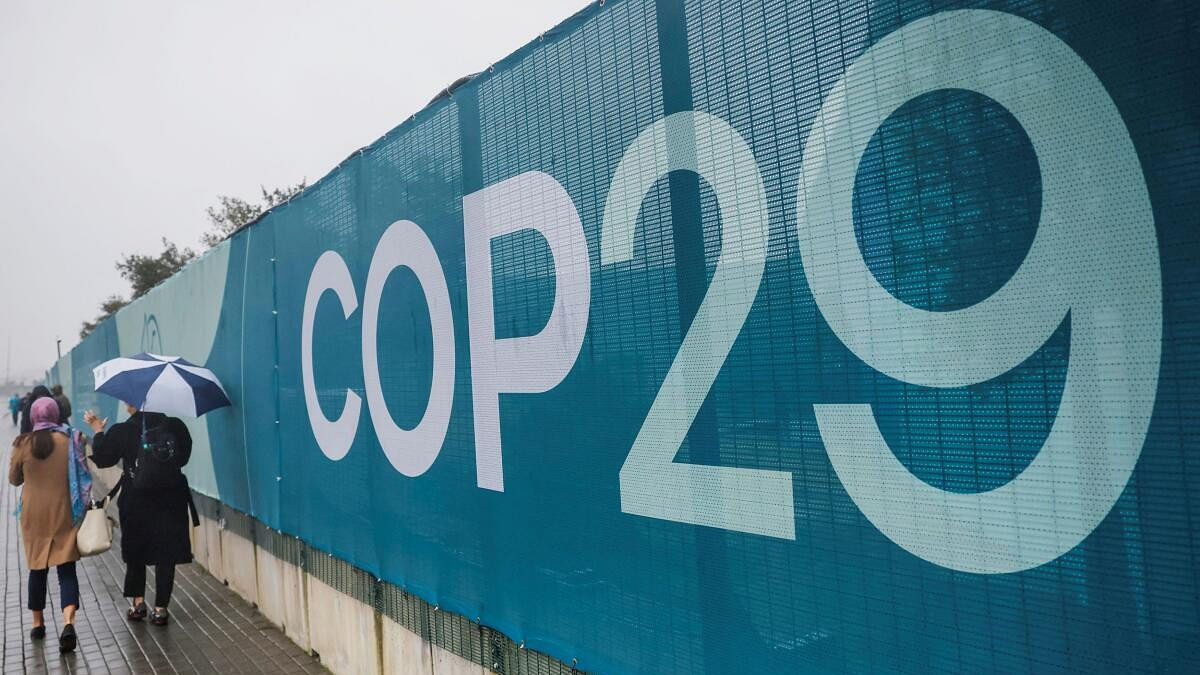
COP29 logo.
Credit: Reuters File Photo
New Delhi: At the ongoing UN climate summit, India on behalf of like-minded developing countries has demanded a fund flow of $ 1.3 trillion every year till 2030 from rich nations for battling the dangerous consequences of climate change as frequency of extreme weather events are on the rise throughout the world.
India’s lead climate negotiator Naresh Pal Gangwar, an Additional Secretary said the money should flow to the developing world without subjecting the recipient nations to conditions that would eventually block their economic growth.
New Delhi noted that developed countries needed to commit, provide and mobilise at least $ 1.3 trillion annually till 2030, through grants, concessional finance and non-debt-inducing support, catering to the needs of developing countries.
Moreover, such support must come without subjecting the developing world to “growth-inhibiting conditionalities” in the provision of finance, Gangwar said in his intervention during a high-level dialogue on climate finance at Baku last night.
A day later in another intervention, he said unilateral trade measures in the name of climate action were "discriminatory, harm multilateral cooperation" and go against the principles of the UN climate change convention.
Participating in the presidential consultations on 'unilateral measures' on Friday, Gangwar said it was a matter of global concern that needed urgent consideration to ensure the development pathways of developing countries were not constricted.
India’s intervention comes at a time when leaders in the Azerbaijan capital are working on a new global climate finance mechanism known as NCQG (new collective quantified goal) for the world beyond 2025 when the commitment under the Paris agreement would expire.
Gangwar said restrictive unilateral measures would compel the middle- and low-income nations to bear the costs of transitioning to low-carbon economies, undermining climate finance commitments from advanced nations that benefited from industrialisation and contributed the most to greenhouse gas emissions.
“This effectively will result in the reversal of climate finance mobilised by the developed countries. It is like asking the victim to pay for the remedy," he said, amidst support from other developing country blocks.
The developed world, however, countered arguing that the UNFCCC was not the right forum to discuss such issues that are already under the consideration of the World Trade Organisation.
India asked for clarity on what constitutes “climate finance” because in the absence of a definition there have been contradictory claims on whether rich nations’ past commitment of providing $ 100 billion per year by 2020, have actually been met.
Way back in 2009, developed countries had stated that they committed to jointly mobilise $100 billion per year by 2020, a deadline now extended to 2025.
While the $100 billion target was already inadequate compared to the actual requirements of developing countries, the real amount mobilised was even less encouraging, Gangwar said, reminding the developed world of its poor performance.
He said a global response to climate change must adhere to the principles of “equity and common but differentiated responsibilities and respective capacities”, while taking into account “historical responsibilities”.
“Also the poverty eradication goal of the Global South should not be lost sight of,” he added.
